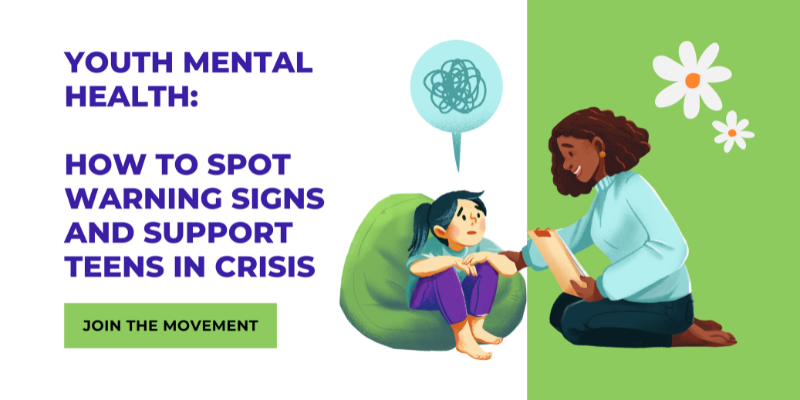Adolescence is a pivotal yet difficult period in life. Teens encounter a variety of stressors, ranging from school achievements to interpersonal relationships, that may impact their mental well-being. Parents and caregivers need to be aware of the indicators of youth mental health challenges and be prepared to offer assistance when necessary.
This blog examines the challenges teenagers face, common mental health conditions, indications of emotional turmoil, and techniques to help parents initiate important discussions with their adolescent children.
Pressures Teens Face that effects Youth Mental Health
Teenage years often come with a tag of expectations and challenges. With academic pressure in the form of exams, applications to colleges, and various extracurriculars, teenagers can easily feel stressed out. There are social pressures to fit in, make and maintain relationships, and withstand abuse. Additionally, social media makes people think that they should lead a certain lifestyle and pressure themselves, which leads to feeling lossy and depressed.
Coping with self-identity including gender, sexual orientation, and career ambitions is another one of the challenges for many teens. Family-related issues such as separation or divorce, monetary problems, and projected breakthroughs may add to some wrappers of mental stress.
All these pressures can be seen as barriers which if identified and understood enough can be wise indicators to offer childhood stress support measures. Teenagers avoid showing feelings, which suggests that understanding what teen challenges one may be inclined to act will make one more forgiving.
How Will I Know If My Teen is Struggling?
Parents may find it challenging to differentiate between typical teenage behavior and signs of deeper struggles. It’s normal for teens to have mood swings, test boundaries, and desire independence. However, consistent or extreme changes in behavior warrant closer attention.
Pay attention to your child’s communication patterns, sleeping habits, and daily routines. Are they withdrawing from activities they used to enjoy? Do they seem irritable or hopeless most of the time? Trust your instincts—if something feels off, it’s better to investigate further.
Signs Mental Health Difficulties in Teens
Many identifiable signs can give parents a clue if their teen is having problems with mental health. Let’s look at some of them.
- Emotional Switch: An individual can be angry beyond control or can have low moods for quite a while which will be considered unusual behavior.
- Behavioral Change: It can be social withdrawal, distancing oneself from peers and duties, or substandard academic performance.
- Physical Symptoms: These can be nonspecific complaints including headaches, frequent tummy aches, and body aches with no clear organic causes.
- Risky Behavior: Increased use of alcohol or drugs, reckless activities, or self-harming tendencies.
- Eating Patterns: Extreme weight loss, excessive late-night snacking, and overeating to the point of discomfort are all factors that affect sleep.
These signs should give parents concerns if they persist for over 2 weeks, followed by expressing active self-harming thoughts or suicidal tendencies, and require immediate intervention.
What Mental Health Conditions Are Most Common for Teens?
Youth Mental health conditions often emerge during adolescence. Some of the most common issues include:
- Anxiety Disorders: Generalized anxiety, social anxiety, and panic disorders can make everyday situations feel overwhelming.
- Depression: This goes beyond sadness, manifesting as persistent hopelessness, low energy, and difficulty concentrating.
- Eating Disorders: Conditions like anorexia, bulimia, or binge eating often stem from a need for control or societal pressures.
- ADHD: While often diagnosed in childhood, attention-deficit/hyperactivity disorder can significantly impact teens.
- Substance Use Disorders: Substance abuse can lead to dependency, particularly for teens using substances to cope with emotional pain.
How Can I Open a Conversation with My Child?
Start talking to your teen about sensitive issues like mental health awareness. Here are some expert tips on coping with difficult emotions that can help in this open conversation:
- Time and Place: Pay attention to the place and make sure that it’s quiet and private so that your teen can talk to you with confidence. There are better times to discuss sensitive issues than Downtimes.
- Express Concern Without Judgment: Frame your sentences with I’ statements; As in, “I feel that you have too much stress around you and that’s why I am concerned.”
- Be Patient: Allow your teenager to speak without interrupting them. Being confrontational is also not the best strategy when a teen is talking about one’s problems.
- Encourage Them: Teens can sometimes take time to talk. It is ok if the parent leaves the point open as one must be able to talk whenever they are ready.
- Provide reassurance: The parents must ensure that it is alright to seek help, as it is never wrong to go for help. If parents feel their teen is adamant, they seek help through schools or doctors.
Final Thoughts
Supporting a teen who is going through mental health struggles can be overwhelming, but your presence with an open mind, and the will to support them makes all the difference. Understanding the issues faced by teens, spotting warning signs, and cultivating open communication can save your child.
If you are unsure about how to go about it, you can find mental health resources on our website. Help is always out there, so you don’t have to travel through this alone.

